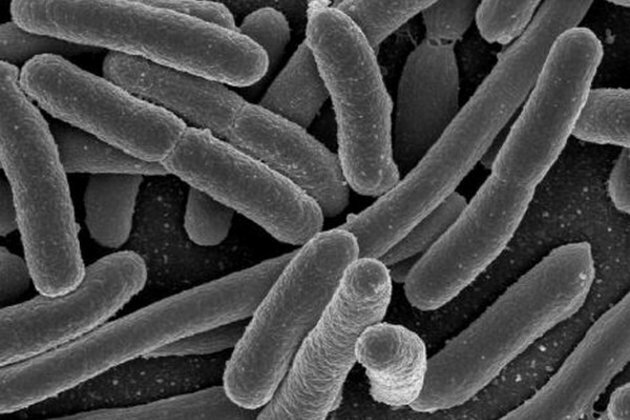Study shows superbugs in the environment rarely transfer over to humans
ANI
22 Nov 2022, 14:33 GMT+10

Washington [US], November 22 (ANI): An international team of scientists investigating transmission of a deadly drug-resistant bacteria that rivals MRSA, has found that whilst the bugs are found in livestock, pets and the wider environment, they are rarely transmitted to humans through this route.
The researchers, led by Professor Ed Feil from the Milner Centre for Evolution at the University of Bath, investigated the prevalence of Klebsiella, a family of bacterial species that lives harmlessly in the intestines, but can be dangerous if it spreads to other parts of the body.
Klebsiella pneumoniae is the most well-known species in this family, which can cause pneumonia, meningitis, urinary tract infections and infections in the bloodstream.
These bacteria are now highly resistant to antibiotics, with some strains even resistant to carbapenems, one of the so-called "last resort" class of antibiotics which is only used when no other antibiotic treatment works.
Klebsiella has overtaken MRSA as a health problem in the UK, with rates steadily increasing. The WHO has recognised the bacteria as a critical priority healthcare associated pathogen.
As well as being found in hospitals, the microbe has also previously been detected in the environment, including livestock and wastewater, but until now it wasn't clear whether the bacteria were passed between clinical and non-clinical environments.
In the largest scale study ever conducted, the team collected 6,548 samples over a 15 month period from different locations in and around the Italian city of Pavia, where this pathogen is a major problem in hospitals, and analysed them using whole genome sequencing techniques to detect and identify any Klebsiella bacteria present.
The team swabbed patients in hospitals and healthy 'carriers' in the community, took samples from farms, puddles, domestic animals and even house flies and other insects to detect where the bacteria was present.
From this, they found 3,482 isolates including 15 different species of Klebsiella, with half of the positive samples containing K. pneumoniae.
When the team genetically sequenced the bacteria to find which strains were present, they found that there was very little overlap between those bugs found in the hospitals and those found in the environment.
Professor Ed Feil, who led the study, said: "Klebsiella infections are becoming increasingly resistant to antibiotics, so whereas you used to be able to treat most urinary tract infections easily, now it is more common that patients are getting infections that keep coming back and causing problems.
"Klebsiella can also cause pneumonia, which kills around half of patients. These bacteria are a bigger problem in the UK than MRSA.
"Our researchers wanted to find out whether resistant bacterias are now spreading into pets, farms, livestock, plants, and water, and so we wanted to investigate where Klebsiella is found and monitor how it spreads, to inform how best to prevent and control outbreaks.
"We found it was present everywhere, but were surprised that the strains found in hospital were different to those found in the environment, indicating there's very little transfer between the two habitats: humans nearly always catch this from other humans.
"This confirms the best way to control infection for these bacteria remains stringent hospital hygiene, and that there is less chance that outbreaks may be caused by contact with animals or the environment than previously feared, at least in a high-resource country like Italy."Dr Harry Thorpe, from the University of Oslo (Norway) and first author of the paper, said: "The fear was that farmers might get these bacteria from their livestock or soil, that we could get infected by contaminated salad or get sick if we swim in lakes that are infected.
"Our research did not give any evidence of this, however, we did find resistant klebsiella in pets, such as cats and dogs. Vets and owners should be aware of this, as these animals could pose a risk for spreading the bacteria."The project consortium, called SpARK, was led by Bath but included researchers from the UK (Wellcome Sanger Institute, Universities of Bristol and Glasgow), Norway, France, Finland and Italy. The work was funded by the Joint Programming Initiative on Antimicrobial Resistance (JPI-AMR), and the MRC, and published in Nature Microbiology.
Professor Feil said: "This is the biggest, most systematic study that has been conducted at the same time in a single geographical location.
"We looked at transmission of strains, however antibiotic resistance can be conferred to other strains very easily when they swap and pick up circular pieces of DNA called plasmids.
"Next we want to track how plasmids are transferred between strains, using a technique called long read sequencing." (ANI) Share
Share
 Tweet
Tweet
 Share
Share
 Flip
Flip
 Email
Email
Watch latest videos
Subscribe and Follow
Get a daily dose of Bristol Star news through our daily email, its complimentary and keeps you fully up to date with world and business news as well.
News RELEASES
Publish news of your business, community or sports group, personnel appointments, major event and more by submitting a news release to Bristol Star.
More InformationUnited Kingdom
SectionShell rejects claim of early merger talks with BP
LONDON, U.K.: British oil giant Shell has denied reports that it is in talks to acquire rival oil company BP. The Wall Street Journal...
China: Building a 'Patriots Only' Hong Kong
(New York) - China's government has erased Hong Kong's freedoms since imposing the draconian National Security Law on June 30, 2020,...
China boosting purchases of Russian metals Bloomberg
Aluminum, copper and nickel shipments have surged this year, according to trade data Beijing has increased purchases of Russian metals...
FIFA Club WC: Last two QF spots up for grabs as Real Madrid, Dortmund among teams in action
New Delhi [India], July 1 (ANI): The last two spots for the quarterfinals of the FIFA Club World Cup will be sealed by either Spanish...
"Everyone was sort of very tired from week": Ben Stokes reflects on England's fitness ahead of second test against India
Birmingham [UK] July 1 (ANI): Heading into the second test against India at Edgbaston, Birmingham, England skipper Ben Stokes spoke...
Why is Islamophobia so hard to define?
The UK government wants a new definition of Islamophobia and has created a working group of politicians, academics and independent...
International
SectionNative leaders, activists oppose detention site on Florida wetlands
EVERGLADES, Florida: Over the weekend, a diverse coalition of environmental activists, Native American leaders, and residents gathered...
Beijing crowds cheer AI-powered robots over real soccer players
BEIJING, China: China's national soccer team may struggle to stir excitement, but its humanoid robots are drawing cheers — and not...
COVID-19 source still unknown, says WHO panel
]LONDON, U.K.: A World Health Organization (WHO) expert group investigating the origins of the COVID-19 pandemic released its final...
Fox faces $787 million lawsuit from Newsom over Trump phone call
DOVER, Delaware: California Governor Gavin Newsom has taken legal aim at Fox News, accusing the network of deliberately distorting...
DeepSeek faces app store ban in Germany over data transfer fears
FRANKFURT, Germany: Germany has become the latest country to challenge Chinese AI firm DeepSeek over its data practices, as pressure...
Canadian option offered to Harvard graduates facing US visa issues
TORONTO, Canada: Harvard University and the University of Toronto have created a backup plan to ensure Harvard graduate students continue...













